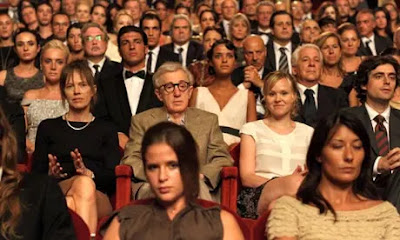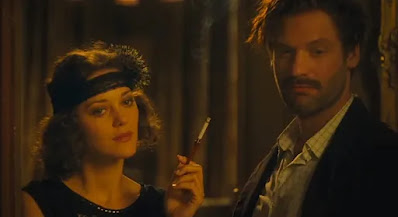The Trump Card
or
"My God, Were You Born This Cynical?"
"Winning isn't everything. It's the only thing."
Vince Lombardi
When I think of that quote, I want to kick Vince Lombardi through the goal-posts.
That sentiment is exactly what's wrong with the country right now—the idea that it is best to win at all costs. And it's what Miss Sloane, the too-clever-by-half film about cut-throat lobbying tactics is all about.* Jessica Chastain plays a much-in-demand, but not-exactly-respected lobbyist for a firm that has a Senator for a client who's trying to head off a new gun registration law by creating a campaign to make women "comfortable with guns." Sloane thinks that idea's a hoot, and thinks the gun-lobby just wants to hire a female lobbyist to put a woman's face to the campaign, and so much so that she refuses to work on it, which causes her boss (Sam Waterston) to get all-cranky and threaten her with her job. Good thing she gets an offer from the lobbying group on the other side, so that she can stick it to her bosses with great brio and more than a little self-righteous verve.

When we first meet her, Sloane is being deposed by her lobbying firm's lawyer. She's been accused of bribery and illegal activities by a Senate sub-committee (led by John Lithgow's on-the-take Senator) and she's learning how to "take the fifth" without over-editorializing other than the standard requirements, so she doesn't dig herself any deeper than she already is. Well, good luck with that. Right off the bat, she's all too willing to tell her mouthpiece her philosophy of life: "Lobbying is about foresight and anticipating your opponents' moves and creating counter-strategies. The winner always plays one step ahead and plays their trump card just after the opponents play theirs."

She knows her opponents only too well—she's worked for them and probably already given them her playbook for winning at all costs. Her opponents are not the gun-lobby, it is her very industry and its tactics that she's very adept at playing. She is cut-throat, take-no-prisoners, leave-no-one-alive tough in her work, feelings and principles be damned. And if she has to roll over a few people, even colleagues, to get the better hand, she will roll over them without batting an eye or mussing a single red hair out of place.
Or losing any sleep. That's a problem. Sloane pops pills to keep her energy up during the day, but she has a hard time sleeping at night. It's not angst, it's not guilt, it's pharmacology that keeps her awake, and those little white pills keep her going at the manic level the job requires, that allows you to start rebutting before your opponent can finish their sentence. The pills, taken with a healthy dose of ego, get her through the day.

Basically, Madelyn Elizabeth Sloane just wants to win. She doesn't think she should be working for the gun-lobby; she might win, but, in the long run, she's going to lose some of the prestige she's acquired. Plus, the amendment is designed to kill background checks, which Sloane believes in. So much so, she quits after getting an offer from a rival lobbying organization run by Mark Strong. She takes most of her team with her, except one loyal assistant (Allison Pill) who doesn't want to commit career-suicide. Once at the other firm, she immediately is the bull in the china shop, abrasively undercutting the firm's previous efforts and going on a new tangent. As she escalates, so does her firm's efforts under the guidance of her old boss (Michael Stuhlbarg, with three "jerk" roles in the last two months) to counter her moves and undercut her efforts.

Some may see this as a political film (and it's certainly in the wheelhouse), but, it's not about "the gun lobby"—arguments pro and con are tossed around as so much background noise for authenticity—and it certainly will make you think it is, although it is not very successful as one. But, truth is, it's a "sting" movie, where the audience is kept in the dark, much like Sloane's opponents, until she plays her "trump card." But, why she plays it thoroughly undercuts the character and negates the rest of the film. The main issue with the movie is, even after the card is played, there is no one to root for or feel sorry for—everybody is a good-for-nothing in a system so corrupt that the novelty isn't that people are doing anything illegal, it's that they're leaving evidence to that effect. You don't have a "dog in the fight," except feeling that the movie is one.

It's good to see Chastain playing such a role. She's made her initial mark by playing sensitive and supportive Moms in some very good things and competent functionaries. But, it's great to see her in full Bette Davis-dither as she plays here, and as she did in 2014's A Most Violent Year. There's an "alienness" to Chastain that allows her to pull off things like this and Zero Dark Thirty, where you can believe that she's effective all the while being the "800 pound gorilla" in the room. She towers over everybody in the film, and it's a cast that doesn't have any slouches.
But, even though the character is the driving force of the film's through-line, it isn't enough to pull off this rather weak exercise in hand-wringing. Trouble is, this type of film is better done as black-comedy—although I've yet to see an example that does it successfully other than In the Loop. You have to match the tone, by being as cold-blooded as the operatives, rather than have it over-boil with indignation.
Perhaps the incoming presidential term will inspire something along those lines.
* No, it's not "about gun-control", as has been purported in reviews by internet writers who haven't seen it (self-proclaimed as in "I wouldn't spend any money on this lib-tard gun-control garbage"), or (evidently by what I've seen) invested in Spell-Check. It's about lobbying groups cutting ethical corners to "get their way" at all costs...for whatever reason...to the detriment of both sides. But, you have to "see" the movie in order to understand that. Unfortunately, in the "wild west" of the Internet, you don't have to know what you're talking about in order to make a comment...and, you can even brag about it to prove your passion as well as the depths of your ignorance.
Who said "Better to remain silent and be thought a fool than to speak and remove all doubt."?




%20Filming%20Locations7.jpg)































